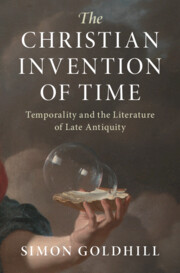Book contents
- The Christian Invention of Time
- Greek Culture in the Roman World
- The Christian Invention of Time
- Copyright page
- Contents
- Acknowledgements
- Abbreviations of Ancient Sources
- Introduction
- Part I
- Part II
- Chapter 11 Beginning, Again
- Chapter 12 The Eternal Return
- Chapter 13 Regulation Time
- Chapter 14 Day to Day
- Chapter 15 ‘We Are the Times’
- Coda
- Bibliography
- Index Locorum
- Subject Index
Chapter 15 - ‘We Are the Times’
Making History Christian
from Part II
Published online by Cambridge University Press: 13 January 2022
- The Christian Invention of Time
- Greek Culture in the Roman World
- The Christian Invention of Time
- Copyright page
- Contents
- Acknowledgements
- Abbreviations of Ancient Sources
- Introduction
- Part I
- Part II
- Chapter 11 Beginning, Again
- Chapter 12 The Eternal Return
- Chapter 13 Regulation Time
- Chapter 14 Day to Day
- Chapter 15 ‘We Are the Times’
- Coda
- Bibliography
- Index Locorum
- Subject Index
Summary
To a reader familiar with the Hebrew text, both the action of the raven and the interpretation are challenging. The Hebrew text reads va’yetze yatzov vashov, which is standardly translated ‘he went to and fro’ until the waters receded. The first bird, that is, can find no place to land but travels around and around. This leads to some delightful and bizarre midrashim. In bSandhedrin 108b, a conversation is imagined between the raven and Noah in which the raven rejects the task offered with a knock-down argument. He must be hated by God and by Noah, the raven argues, to have been selected for the mission, because, since they are unclean animals, there are only two ravens in the ark. If he died from heat or cold, therefore, the species of ravens would be wiped out. He adds that he suspects Noah of wanting to get rid of him so that he can have sex with the raven’s wife! (Noah retorts angrily that since he has observed the prohibition of sex on the ark with his own wife he is scarcely likely to have sex with a raven.) Hence, however, the fearful raven will only fly round and round the ark. Midrash Rabbah Bereshit imagines a different conversation – the idea of a conversation comes from an etymological play on the Hebrew verbs. Noah asserts blithely that the raven can be sent because as an unclean animal he is no good for food or for a sacrifice, only to be reminded by God that ravens would feed Elijah in the desert (Kings 1.17.6) – a paradigmatic demonstration of how the narrative of the Talmud is informed by God’s omniscient (always already) time.
- Type
- Chapter
- Information
- The Christian Invention of TimeTemporality and the Literature of Late Antiquity, pp. 380 - 419Publisher: Cambridge University PressPrint publication year: 2022



